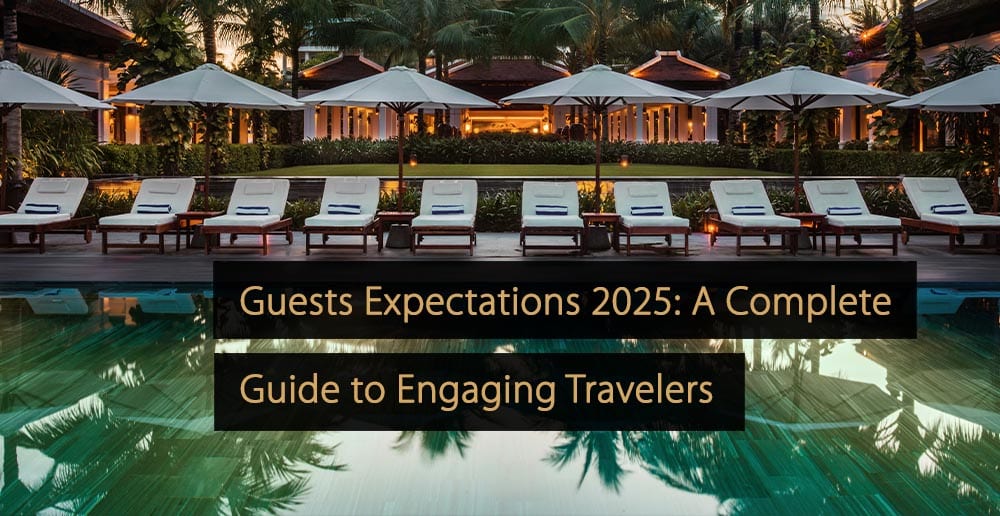Hotel guests have different circumstances and priorities, so hotels need to understand that there is no ‘one size fits all’ solution to attracting them. In this article, we will break down the main types of guests, provide tips for appealing to each guest type, and offer more general advice for exceeding customer expectations during their stay.
Table of Contents:
- What is the Hotel Industry?
- Different Types of Hotel Guests and How to Attract Them
- 3 Tips to Exceed Any Hotel Guests Expectations
- Hotel Breakfast: Impress Hotel Guests With Your Breakfast Offerings
- Social Media Strategies to Attract Hotel Guests
What is the Hotel Industry?
It can be useful to begin by explaining the hotel industry precisely. Simply put, this refers to the industry that provides guests with temporary accommodation or lodgings. Businesses within the industry provide hotel guests with overnight stays in exchange for money, but long-term and permanent accommodation falls outside this definition.
That said, it is worth highlighting that the hotel industry usually includes all forms of temporary guest accommodation rather than solely focusing on hotels. This could include resorts, motels, hostels, inns, bed and breakfasts, serviced apartments, guest houses, holiday cottages, and more.
In the article “Hotel Industry: Everything You Need to Know About Hotels!” you will learn more about what the hotel industry is, how it is defined, what separates it from hospitality, and the major trends affecting the industry.
Different Types of Hotel Guests and How to Attract Them
Hotel guests come in many different forms, and one of the big challenges involves using the right hotel marketing strategies to target the right guest type. In the sections below, you can learn about some of the main types of hotel guests that businesses are likely to encounter and some advice on how to appeal to each group.
Business Travelers
Business travelers are travelers who visit different locations for the purposes of work. They may be traveling to attend business events, conferences, or meetings and may need to carry out other work tasks during the day. This means they are less likely than many other hotel guests to be interested in tourist attractions.
Hotels can appeal to business travelers in several ways. The provision of high-speed internet access, for example, can be a major draw, as business travelers may need to participate in online video calls and other activities that require a reliable connection. Conference rooms, work areas, and other facilities can hold strong appeal too.
That said, focusing on their time away from work is also essential. After a long day, business travelers are likely to want a comfortable room, with a few luxuries. It is also good to appeal to corporate guests by highlighting favorable room rates, transport links, local restaurants, the hotel bar, and room service offerings.
For more information on “bleisure travel”, read “What is Bleisure Travel? What Are Bleisure Travelers Looking For?”
Couples and Families
Hotels looking to maximize the number of guests they attract should try to appeal to couples and families, and these types are likely to have some specific priorities. For couples, for example, comfortable rooms, a king-size bed, a nice view, and access to nice restaurants can help to make the decision easier.
Families, meanwhile, will often have an obvious idea of what they want to do and when they want to do it. However, it may be possible to appeal to them by providing great value for money on their booking, and this can also be highly beneficial to hotels because they will be filling multiple rooms simultaneously.
In some cases, families may be looking for all-inclusive stays, which gives hotels with excellent food services a significant advantage. The presence of a pool, hotel entertainment options, and nearby attractions that can appeal to children should also feature in marketing materials aimed at hotel guests booking family trips.
Luxury Hotel Guests
As the name suggests, luxury hotel guests seek the best travel experiences and will spare no expense to find the best accommodation. Luxury travelers are high-value customers and are primarily going to be attracted to 5-star hotels, which can provide excellent facilities, exquisite comfort, and a great location.
Many luxury travelers are older adults who often travel with a partner. The aesthetic qualities of a hotel are important, and many of these guests will book their stays through a travel agent or tour operator, so these distribution channels should be prioritized. The quality of the hotel restaurant can also be a major draw.
Luxury travelers may know the latest hotel marketing trends and have very high expectations. Hotels looking to appeal to these travelers will need to deliver exceptional customer service. At the same time, it can attract luxury guests by highlighting local experiences, attractions, restaurants, and events.
Digital Nomads
Digital nomads make a living by working online but from different locations. They may be business owners, self-employed or freelance workers, or employees of businesses. Regardless of their circumstances, crucially, they are not tied to a fixed location, and they carry out their work wherever they travel.
Digital nomads can work in hotels, hostels, holiday cottages, inns, bed and breakfasts, and almost any other temporary accommodation. However, reliable internet access is an absolute must. If internet access is slow or Wi-Fi is not reliably available, it is likely to prevent them from making a booking.
Digital nomads are generally technology-minded in many cases, which means they may be attracted to hotels utilizing the latest technology. Having a dependable hotel front office, seamless check-ins and check-outs, and IoT devices in hotel rooms can also be useful. Of course, it should also be understood that digital nomads, like all hotel guests, can also be drawn to an exciting location, great facilities, and local attractions.
Health & Wellness Hotel Guests
Health and wellness-focused hotel guests will likely travel to avoid everyday stress, participate in physical fitness-related activities, or enjoy the peace and quiet. Hotels can often target them by highlighting gyms, leisure facilities, and areas where relaxation is possible.
Some properties may have a specific theme, which can be used for marketing. For example, yoga or meditation retreats are a form of accommodation that promote those particular activities. Other hotels, guest houses, and holiday cottages are ideally placed to target those interested in hiking, skiing, or other physical activities.
A health-conscious hotel guest is likely to want healthy eating options on-site too. Although these guests do sometimes travel in groups, it is common for wellness travelers to travel on their own. It can, therefore, be sensible to target individual travelers with single rooms, low-cost stays, and all-inclusive deals.
Eco-Conscious Hotel Guests
While there are many benefits associated with the travel industry, a growing number of travelers are becoming increasingly concerned about the environmental effects of their travel and are actively seeking more sustainable offerings. This has led to the rise of eco-friendly hotels, and marketing strategies designed to promote sustainability.
Hotels can appeal to these travelers by highlighting the various steps they have taken to reduce their hotel’s carbon footprint and minimize their usage of natural resources. Hotels using sustainable energy with solid recycling policies are at an advantage, while transparency is also important.
Accommodation near a railway station can be beneficial, allowing eco-conscious hotel guests to travel via train and avoid more environmentally harmful flights or car journeys. As with parts of the restaurant industry, there is also increased demand for ethically sourced food and vegetarian and vegan options.
Young Travelers
As a collective group of hotel guests, young travelers share similarities with backpackers in that they are often extremely budget-conscious and may be willing to sacrifice in certain areas for a cheap deal. They are generally drawn to locations with an active nightlife, and to cities with plenty of things to do.
Cutting-edge technology within a hotel may appeal to young people, although they are unlikely to be willing to pay premium prices to access it. Many young people travel in groups, so rooms that allow three or four people to share comfortably are likely more appealing than rooms designed for one or two people.
In general, younger people are likely to want to be able to communicate using online communication tools, and they may wish to share their experiences with friends using social media platforms like Facebook, TikTok, and Twitter. This means that free and reliable Wi-Fi is an especially important service to provide for them.
Backpackers
Backpackers are hotel guests who travel to different locations and live out of their backpacks. They are likely to visit multiple locations during their travels, and their stays can vary significantly in length, but they are almost always price sensitive. Hence, they tend to be drawn to hostels, cheap hotels, and other low-cost accommodations.
The focus on price means that backpackers are often happy to make sacrifices and are less likely to be attracted by the latest hotel trends. Instead, they tend to want the bare minimum regarding facilities and comfort. They are often willing to share facilities like bathrooms, and upselling and cross-selling efforts are unlikely to work.
Aside from affordable overnight stays, one of the major focus areas for many backpackers is likely to be the provision of free and reliable Wi-Fi, as this allows them to stay in touch with friends, family, and other travelers. Hotels that can provide an authentic experience of local food and culture will have a big advantage.
3 Tips to Exceed Any Hotel Guests Expectations
One of the best ways to appeal to guests is to build an excellent reputation, which can be achieved by consistently exceeding hotel guests’ expectations. Below, you can find three key tips that will help you with this:
1. Make Check-In a Personal Experience
With hotel check-ins, there are two important things to remember. First of all, you will never have a second chance to make a first impression, and secondly, your hotel guests want to be treated as individuals rather than just another customer. With these two ideas in mind, one way to exceed customer expectations is to make the check-in process personal. Use your information about your guests to greet them, provide something that makes them feel welcome, gives your hotel meaning, and sets a positive tone for their stay.
2. Recommendations of Hidden Local Gems
Hotel guests may come to the front desk for advice about where to go and what to see. While many hotels are situated near interesting tourist hotspots, a hotel can exceed expectations by making more nuanced recommendations about local restaurants, sites of interest, or day trips that may be less immediately obvious. This can also help ensure guests have a unique experience, rather than only covering the standard places everyone sees.
3. Provide Personalized Communication
Finally, it can be beneficial to try to provide personalized communications over the duration of a hotel guest’s stay. For instance, it may be possible to send them personalized recommendations of activities through the hotel’s mobile app, or it could be possible for those in charge of front desk hotel operations to follow up with guests on activities booked through the hotel. These small, personal touches can help guests feel valued and make them more likely to recommend your hotel to friends and family too.
Video: Luxury Hotel Guest Experience
Hotel Breakfast: Impress Hotel Guests With Your Breakfast Offerings
Breakfast is often said to be the most important meal of the day, and a hotel breakfast can be the ideal way to impress guests and ensure they are eating well during their stay. Hotels can provide many different types of breakfasts, including English, Continental, American, breakfast buffets, and breakfast room service.
In the article “Hotel Breakfast: Types, Overview & Tips to Impress Your Guests” you will learn about the different types of breakfasts hotels offer, and the ways you can inspire hotel guests with a morning meal.
Social Media Strategies to Attract Hotel Guests
More travelers are using social media to learn about hotels, share their experiences with friends and family, and even book their stays. This makes it essential for hotels to think about how they can use social media platforms to attract guests and enhance their reputation online.
In the article “8 Social Media Strategies For Hotels to Engage With Guests” you will be able to find out about competitor tracking, the use of video content, the value of tailoring content to different platforms, and much more.
Different types of hotel guests are available for hotels to attract, but you will need to know how to appeal to them. With each hotel guest type, it is important to focus on their top priorities and design marketing materials and pre-arrival communications highlighting relevant hotel features.
More Tips to Grow Your Business
Revfine.com is the leading knowledge platform for the hospitality and travel industry. Professionals use our insights, strategies, and actionable tips to get inspired, optimize revenue, innovate processes, and improve customer experience.Explore expert advice on management, marketing, revenue management, operations, software, and technology in our dedicated Hotel, Hospitality, and Travel & Tourism categories.
This article is written by:
Hi, I am Martijn Barten, founder of Revfine.com. With 20 years of experience in the hospitality industry, I specialize in optimizing revenue by combining revenue management with marketing strategies. I have successfully developed, implemented, and managed revenue management and marketing strategies for individual properties and multi-property portfolios.









I think high-speed internet access is indeed a must these days. As you said, digital nomads or business guests often need to participate in video calls. I always ask the hotel about the quality of the internet. The amenities matter to me, but since I need to attend a meeting every morning, good internet speed is important.